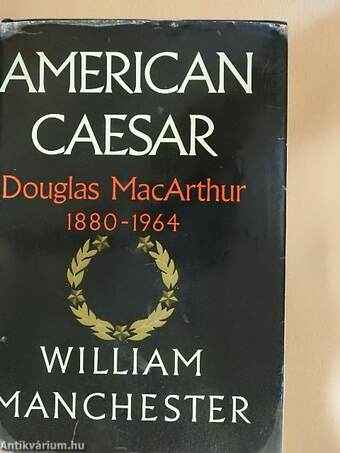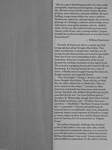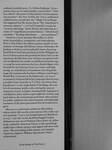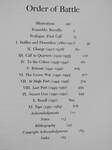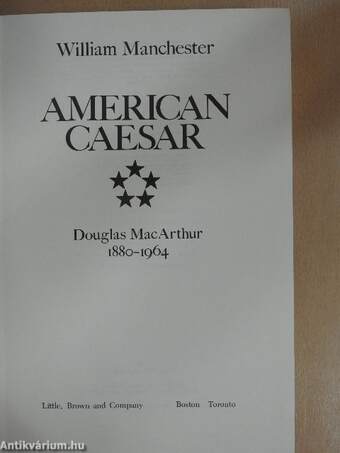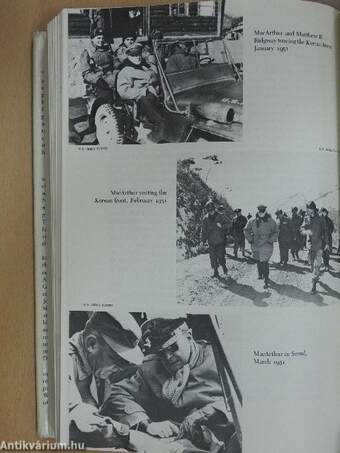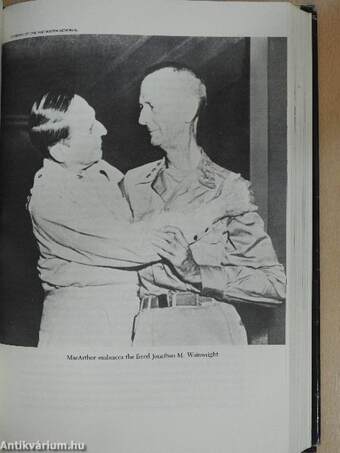1.067.081
kiadvánnyal nyújtjuk Magyarország legnagyobb antikvár könyv-kínálatát

VISSZA
A TETEJÉRE
JAVASLATOKÉszre-
vételek
American Caesar
Amerikai Cézár - Douglas MacArthur 1880-1964/Douglas MacArthur 1880-1964
| Kiadó: | Little, Brown and Company (Canada) Limited |
|---|---|
| Kiadás helye: | Boston |
| Kiadás éve: | |
| Kötés típusa: | Vászon |
| Oldalszám: | 793 oldal |
| Sorozatcím: | |
| Kötetszám: | |
| Nyelv: | Angol |
| Méret: | 24 cm x 16 cm |
| ISBN: | 0-316-54498-1 |
| Megjegyzés: | Fekete-fehér fotókkal, illusztrációkkal. |
naponta értesítjük a beérkező friss
kiadványokról
naponta értesítjük a beérkező friss
kiadványokról
Fülszöveg
"He was a great thundering paradox of a man, noble and ignoble, inspiring and outrageous, arrogant and shy, the best of men and the worst of men, the most protean, most ridiculous, and most sublime. No more baffling, exasperating soldier ever wore a uniform. Flamboyant, imperious, and apocalyptic, he carried the plumage of a flamingo, could not acknowledge errors, and tried to cover up his mistakes with sly, childish tricks. Yet he was also endowed with great personal charm, a will of iron, and a soaring intellect. Unques-tionably he was the most gifted man-at-arms this nadon has produced."
— William Manchester
Virtually all Americans above a certain age hold strong opinions about Douglas MacArthur. They either worship him or despise him. And they are all I wrong, because their premises are rooted in apocrypha. I Now one of our most outstanding writers, after a meticulous three-year examination of the record, presents his startling conclusions in this superb book. The narrative... Tovább
Fülszöveg
"He was a great thundering paradox of a man, noble and ignoble, inspiring and outrageous, arrogant and shy, the best of men and the worst of men, the most protean, most ridiculous, and most sublime. No more baffling, exasperating soldier ever wore a uniform. Flamboyant, imperious, and apocalyptic, he carried the plumage of a flamingo, could not acknowledge errors, and tried to cover up his mistakes with sly, childish tricks. Yet he was also endowed with great personal charm, a will of iron, and a soaring intellect. Unques-tionably he was the most gifted man-at-arms this nadon has produced."
— William Manchester
Virtually all Americans above a certain age hold strong opinions about Douglas MacArthur. They either worship him or despise him. And they are all I wrong, because their premises are rooted in apocrypha. I Now one of our most outstanding writers, after a meticulous three-year examination of the record, presents his startling conclusions in this superb book. The narrative is gripping because the General's life was I fascinating. It is moving because he was a man of 1 vision. It finally ends in tragedy because his character, | though majestic, was tragically flawed.
"Very few people," George C. Kenney said, "really know Douglas MacArthur. Those who do, or think I they do, either admire him or dislike him. They are I never neutral on the subject." Certainly no other I American commander has been more controversial. I George Marshall, who disliked MacArthur personally, 1 conceded that he was "our most brilliant general." I Jonathan M. Wainwright, though MacArthur had left | him behind on Bataan, said: " I'd follow that man — anywhere—blindfolded." But Harry Truman branded him "a counterfeit." Liberals and intellectuals de-nounced him as a swashbuckler and a ham. Despite his repeated, almost casual exposure of himself as a target to enemy snipers in three wars and his thirteen decora-I tions for heroism, his Gis scorned him as "Dugout | Doug."
This brilliant biography challenges the cherished myths of MacArthur's fans and critics alike. Solidly researched and scrupulously objective, it re-creates the I past with that sense of immediacy which characterizes I William Manchester's best work. Various critics have offered different explanadons for the author's driving,
endlessly readable prose. To Clifton Fadiman, "its su-preme value can be stated simply: you are there." Time has called it "the power of Manchester's all encompass-ing narrative"; the New Yorker, his "verve, intellectual sophistication, and prickly wit." Hugh Trevor-Roper has suggested that the answer lies in "Mr. Manchester's immense industry" — in Cyril Connolly's words, his "masterly planning." James Reston describes him as a writer of "magnificent narrative history." Alfred Kazin condudes: "Reading Manchester you participate!"
American Caesar presents MacArthur in all his many-faceted glory, complexity, and contradiction. Here is MacArthur the military genius capable of mas-terpieces of strategy (the Bataan retreat, Hollandia, the landing at Inchon) and inexplicable lapses (knowing Pearl Harbor had been attacked, he let his Philippine air force be destroyed on the ground nine hours later by the Japanese); the fifty-four-year-old four-star general who was terrified that his mother would find out that he kept a young Eurasian mistress; the lean, chiseled figure who beneath his stern Roman front was restive and high-strung, an embodiment of machismo who frequently wept; the martinet who had been willing to rout hungry World War I veterans in the Depression, yet was so economical of human life in his campaigns that his total casualties from Australia to V-J Day were fewer than Eisenhower's in the single Battie of the Bulge; the Symbol of reactionary politics who, during his years as American viceroy in Japan, introduced the Japanese to civil liberties, labor unions, equal rights for women, and land reform; the consummate performer who yearned for public adulation but whose hauteur and disdainful treatment of the press guaranteed that he would never get it.
Here too is a previously unknown MacArthur, whose whole life was the army and yet who at the end of it asserted, "I am a one hundred percent disbeliever in war," and who on his deathbed begged Lyndon Johnson to stay out of Vietnam. Here above all, defini-tively realized in American Caesar, is the astonishing soldier-hero whose mystery and appeal will never fade away. The unraveling of this unique, and uniquely American, legend is William Manchester's finest achievement.
Jacket design by Paul Bacon Vissza
Témakörök
- Életrajz > Történelmi személyiségek > Külföldi
- Idegennyelv > Idegennyelvű könyvek > Angol > Életrajz > Történelmi személyiségek > Külföldi
- Idegennyelv > Idegennyelvű könyvek > Angol > Történelem > USA története
- Történelem > Életrajz > Politikusok, történelmi személyiségek > Külföldi
- Történelem > Idegennyelvű > Angol
- Történelem > Kontinensek szerint > Amerika, amerikai országok története > Észak-Amerika
- Történelem > Legújabb kor > II. világháború > Hadtörténet
- Történelem > Hadtörténet > Hadügy, hadviselés
William Manchester
William Manchester műveinek az Antikvarium.hu-n kapható vagy előjegyezhető listáját itt tekintheti meg: William Manchester könyvek, művekMegvásárolható példányok
Nincs megvásárolható példány
A könyv összes megrendelhető példánya elfogyott. Ha kívánja, előjegyezheti a könyvet, és amint a könyv egy újabb példánya elérhető lesz, értesítjük.



